At Belovedsaffron.com we believe that every chef has something unique and delicious to share with their taste buds! If you have any special recipes or would like to contribute an article for our blog section, please don’t hesitate to contact [email protected].
We are devoted to promoting sustainable eating practices that respect cultures worldwide and inspire us with new flavors each day. Let’s work together towards bettering the Earth while enjoying scrumptious dishes!
For now, love yourself and enjoy this one ...
Now love yourself and enjoy this one ...
This easy basted egg recipe brings gourmet flavor to your breakfast table in minutes.
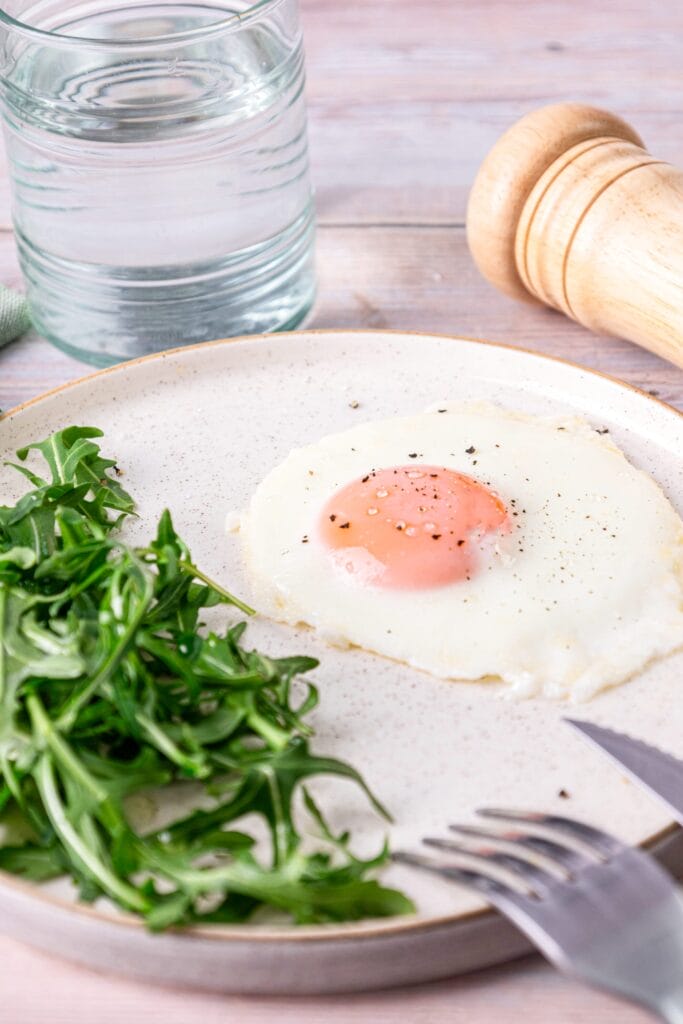
Table of Contents
Have you ever had basted eggs? If not, you’re in for a treat. They look so fancy, but they’re actually quite simple to make. It’s actually one of my go-to breakfasts for the work week. Basted eggs are very similar to sunny-side-up eggs, but there’s one noticeable (and delicious) difference. With the basted method, you cook the top of the egg with your favorite liquid fat, such as butter, oil, or even bacon fat.
Egg yolks have a naturally rich and creamy flavor, but what I like about this recipe is how it turns the creaminess up a few notches—you can thank the butter for that. The butter also helps crisp the edge of the egg whites, a savory contrast to the runny yolk. You can add cracked pepper or a dash of salt, but honestly? This yummy dish stands on its own. But if you’re cooking breakfast for several guests but still want that sunny-side-up flavor, check out my baked eggs recipe.
Are Basted Eggs Healthy?
While there’s a bit of butter in this recipe, I’d still consider this healthy and keto-friendly, especially if you’re using premium ingredients like grass fed butter and free range eggs. I’m not saying that regular eggs are bad, but local free range eggs generally have less cholesterol and richer yolks. You’ll be getting more Vitamin A, D, and E and supporting local farmers, too! And aside from taste, grass-fed butter is rich in beta carotene, vitamin K2, and an assortment of fatty acids like Omega-3.
I understand that many of us are on strict budgets, especially with the unnecessary inflation we’re all seeing at the grocery store. So what I do is buy local farm raised eggs one week, and then another week, I’ll spring for the grass fed butter. It’s okay to eat conventional produce, but if you can, consider alternating with higher-quality local produce as well. It’s good for your health and your farmers
The case For the Egg Yolk
It seems like every few years, there’s a debate about the health benefits of the egg, more specifically, the egg yolk. I’m sure many of us have made our fair share of egg white omelets. But the fact remains that egg yolks are a treasure trove of nutrition. Not only are they rich in vitamin K2 and vitamin D (E, if you count local farm raised eggs), but they also have choline and selenium. Choline is super important for regulating memory, mood, heart health, and more. Selenium is a powerful antioxidant that helps your immune system and hormone balance.
That’s not all.
Yolks also contain lutein and zeaxanthin antioxidants, which aid in eye health and may help reduce overall free radical damage. So, the next time you’re debating whether to toss that yolk in the garbage, consider the array of nutrients it offers. It turns out that the “infamous” egg yolk could be a valuable ally in supporting your overall health.
INGREDIENTS
- 1 tsp. unsalted butter
- 1 large egg
- 1 Tbsp. boiling water
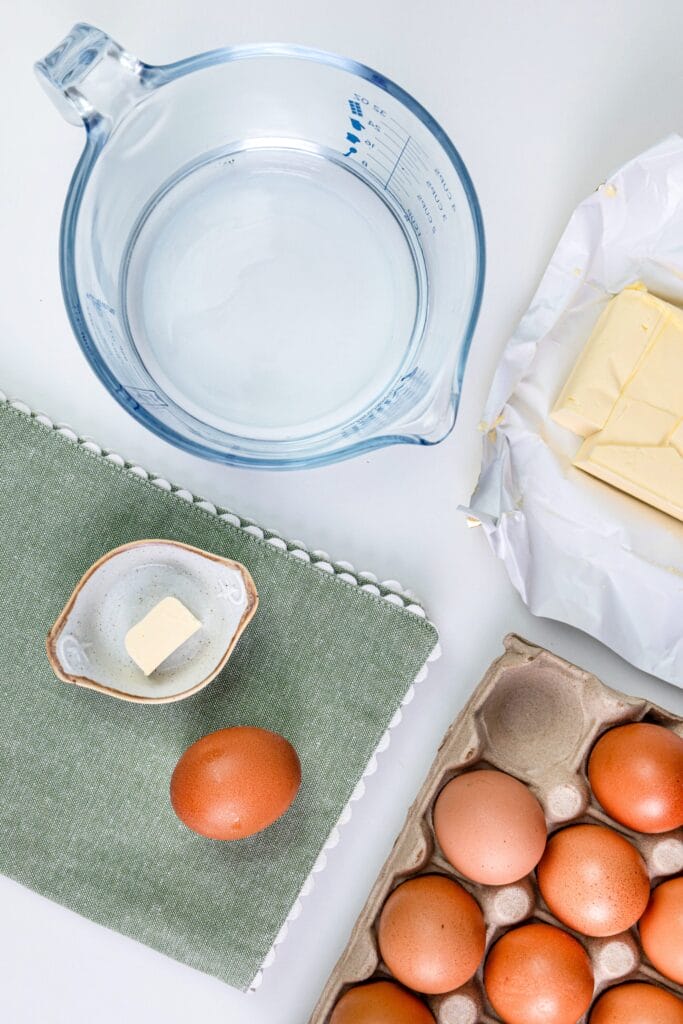
INSTRUCTIONS
Melt
The butter in a skillet over medium heat until foamy.
Crack
The egg into the skillet without breaking the yolk.
Add
Boiling water around the egg and cover the skillet with a lid.
Cook
Until the whites set but the yolk remains runny, about 2-3 minutes.
Serve
The basted egg on a plate and enjoy the deliciousness.
Devour!
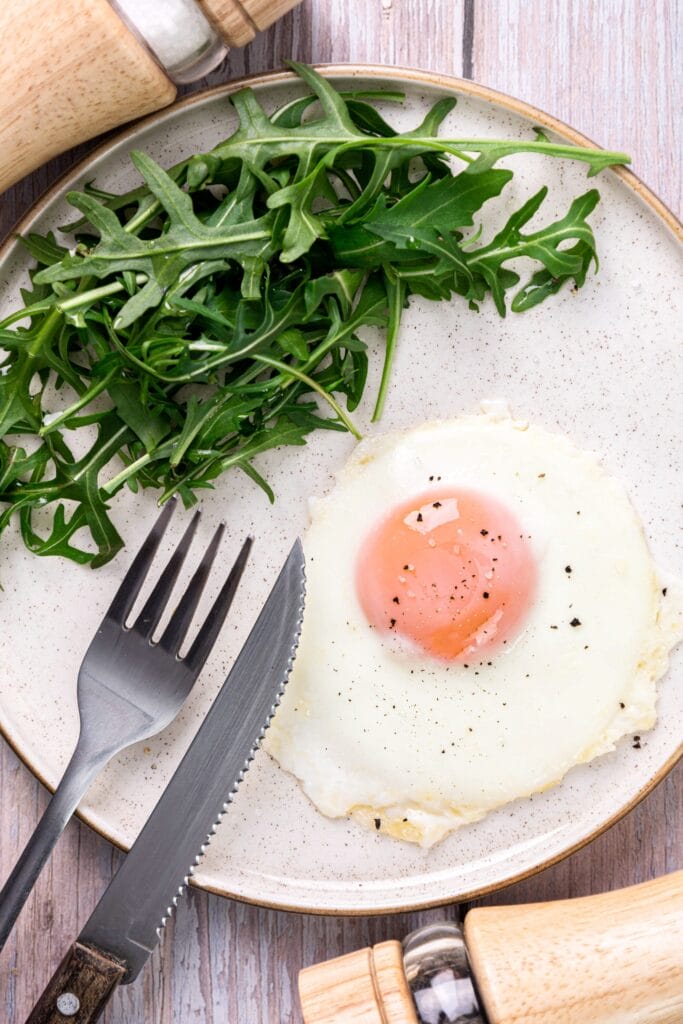
FAQs & Tips
This is one of those recipes where I recommend you enjoy it right away. Basted eggs don’t reheat well, as the whole point is to eat it fresh when the egg is runny.
That’s okay! You can also use an oil—I like olive oil the best. Or you can even use bacon fat or any lard you prefer.
While you can just crack the egg into your pan, that doesn’t always work. Try cracking the egg in a small bowl or dish first, then carefully slide it into the pan. This method provides you with more control, which should reduce the chance of breaking the yolk.
Definitely. Boiling water creates steam when you cover the skillet. This helps gently cook the top of the egg without flipping it, an essential part of the basting process.
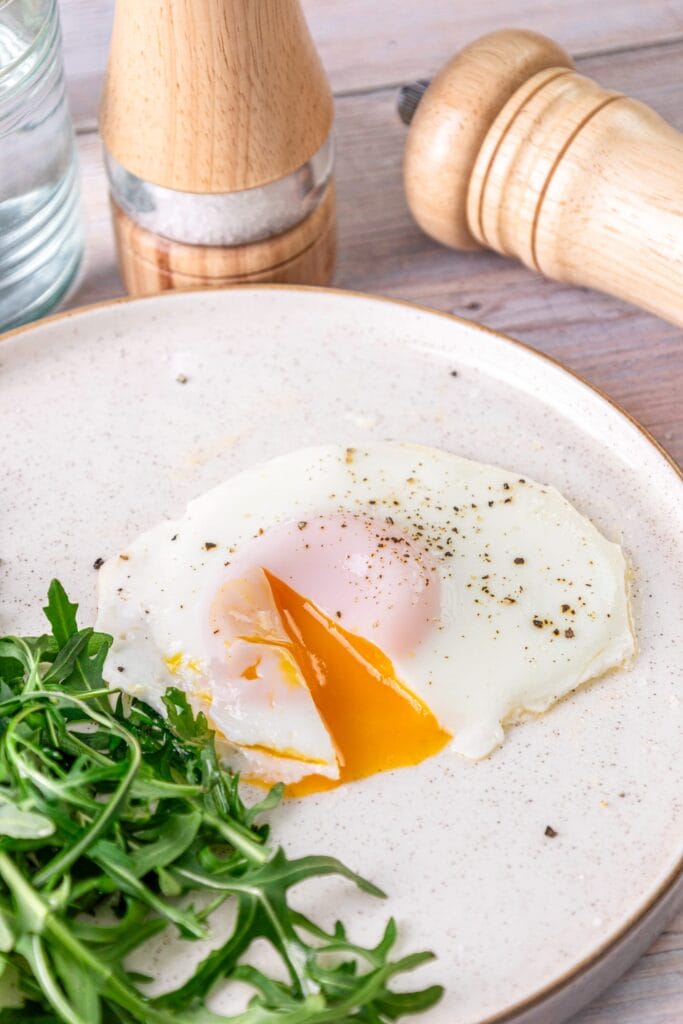
Serving Suggestions
Basted eggs pair well with sausage, turkey bacon, or whatever your cured protein of choice may be. I even like sliding these bad boys on burgers. For a more traditional weekend breakfast, serve them with classics like buttermilk waffles or paleo banana pancakes for some extra protein. And I can’t say no to a side of breakfast potatoes. Sometimes, I don’t want the typical breakfast pairings, so I’ll eat my eggs with a delicious muffin or some banana bread.

Basted Egg
Ingredients
- 1 tsp. unsalted butter
- 1 large egg
- 1 Tbsp. boiling water
Instructions
- Melt the butter in a non-stick skillet over medium heat until it’s foamy but not brown.
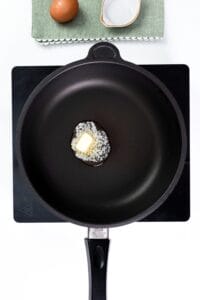
- Gently crack the egg into the skillet, being careful not to break the yolk.
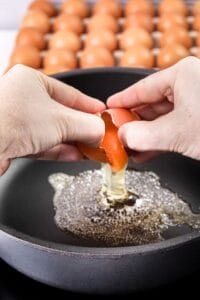
- Let the egg white begin to set, then carefully pour the boiling water around the egg in the skillet.
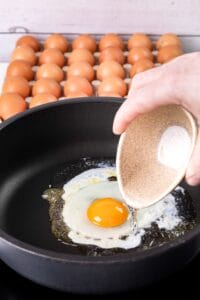
- Immediately cover the skillet with a lid to trap the steam, which will gently cook the top of the egg.

- Cook until the egg whites are fully set but the yolk is still runny, about 2-3 minutes.
- Using a spatula, carefully remove the egg from the skillet and transfer to a plate. DEVOUR!
The post How to Make Basted Eggs appeared first on Food Faith Fitness.
References:
By: FoodfaithfitnessTitle: How to Make Basted Eggs
Sourced From: www.foodfaithfitness.com/basted-eggs/
Published Date: Mon, 18 Mar 2024 16:54:41 +0000
Frequently Asked Questions
What is the difference in organic and non-organic foods?
Organic food is produced without pesticides, chemical fertilizers, sewage sludge, irradiation, or genetic modification. Organic farming practices contribute to soil health, water purity, and animal welfare.
Inorganic foods can be grown using pesticides, chemical fertilizers and sewage sludge. Irradiated foods are treated with radiation; genetically modified organisms (GMO) are created through biological engineering techniques.
Sometimes, the term "natural", is used interchangeably with "organic." But natural does not necessarily imply organic. Natural products can also be labeled with synthetic ingredients.
Organic produce is typically more nutritious than conventional produce because the soil contains fewer harmful chemicals and pesticides. Organic farmers do not use pesticides, artificial fertilizers, hormones, anti-biotics, and other harmful chemicals.
Are organic foods better?
According to the Environmental Working Group’s latest report on pesticide residues, organic fruits/vegetables had nearly half as many pesticides than non-organic. They discovered that organic apples contained eight more pesticides per gram than non-organic ones, while organic strawberries contained four times as many pesticides.
Some studies also suggest that eating organic food helps reduce your exposure to toxic metals, such as mercury and lead. One study revealed that children who ate organic meat had 33 per cent lower blood lead levels than their counterparts who didn't eat organic meats. A second study found that conventional fish should be avoided by pregnant women due to the high levels of mercury.
Organic food seems to be safer than the non-organic. Experts recommend that you choose fresh fruits and vegetables whenever possible to lower your chance of developing cancer or other diseases.
How can you tell organic food from non-organic?
Fresh ingredients are what chefs value the most. It's because we feel better when food is well-prepared.
This is true for food as well. Organics can be traced back to their source and whereabouts. We also know that organics were not treated with harmful chemicals.
Organic food is produced without synthetic pesticides or fertilizers. Organic farmers aren't allowed to use these substances.
Organic farming doesn't have to be difficult. There are many safe ways to grow them.
Sometimes, organic farming is called sustainable agriculture. This means that while it uses fewer resources than conventional methods, it provides the necessary nutrients to sustain life.
Organic farming practices include crop rotations and cover crops, manure composting, intercropping, and cover cropping. These techniques prevent soil erosion while improving water quality.
They also reduce chemical pollution of waterways. Because most people live in urban areas, it is easy to find farms that grow organic produce.
Two types of certification programs are available for organic products. The USDA National Organic Program certifies the one while the independent certifying agency certifies the other. Both require strict adherence of organic standards.
USDA seals and O Seals may be used to identify organic products that meet federal standards.
Is organic the same as pesticide-free?
Organic food is chemical-free and grown without pesticides. This means that organic food is often free of pesticides and fertilizers.
Because organic produce is free of harmful additives, it also has more nutrients than conventionally grown foods.
The USDA National Organic Program (NOP), requires that farmers follow strict guidelines when growing organic crops.
These guidelines cover soil preparation, crop rotation and pest control. They also include water conservation and harvesting techniques.
Organic farming methods also benefit wildlife and natural environments.
What are the things to look for when purchasing organic products?
USDA-certified organic labels are desirable. This guarantees that the product meets certain USDA standards. You will find the USDA Organic seal on all boxes, cartons and cans.
When shopping for meat, ensure it comes from cows fed 100% organic feed. Cattle are ruminants. This means they chew the cud. Ruminant cattle can be found with four stomach compartments: the rumen, the reticulum, omasum, abomasum and omasum. All parts of an animal must be organically fed if the cow is going to be labelled '100% organic.'
Make sure you only buy chicken from chicken farms that are fed organically and have never been given antibiotics. Chickens can eat both animal and plant food. Omnivorous chickens have a digestive tract composed of a crop, proventriculus, gizzard, small intestine, large intestine, and anus.
Buy dairy products that are 100% organically produced. Dairy cows have four stomach compartments, just like ruminants. The fourth stomach, or the udder is where you get milk.
You should always check the label before purchasing any other livestock. This will let you know what percentage of the diet was given to the animals. For example, pork may be labelled '95% organic.' This means 95 percent of the pig's feed came from organic sources.
Statistics
- According to a study performed by consumerreports.org, organic products, compared to non-organic products, ranged anywhere from 13 percent cheaper to 303 percent more expensive. (en.wikipedia.org)
- As for organic meat, regulations require that animals be raised in living conditions that accommodate their natural behaviours (like the ability to graze on pasture), fed 100% organic feed and forage, and not administered antibiotics or hormones. (usda.gov)
- Nutrients like omega-3 fatty acids were up to 50 percent higher in organic meats and milk than in conventionally raised products.[3] (en.wikipedia.org)
- When packaged products indicate they are “made with organic [specific ingredient or food group],” they contain at least 70% organically produced ingredients. (usda.gov)
External Links
[TAG34]
[TAG36]
- A Review of Journal of Toxicology and Environmental Health: Cancer Risk and Occupational Pesticide Expositions: Part B: Vol 15, Number 4
- Genetically modified foods: safety, risks and public concerns--a review - Journal of Food Science and Technology
[TAG39]
- EWG's 2022 Shopper’s Guide to pesticides in produce
- Clean Fifteen(tm) Conventional Produce with the Least Pesticides
[TAG42]
How To
What happens to the body when you switch over to organic products
Organic products are grown without pesticides, synthetic fertilizers, hormones, antibiotics, or genetic manipulation. They are free-range and come from clean water sources. The term "organic" means they do not contain any chemicals or additives. This product was naturally produced and contains no harmful chemicals.
Natural refers to the way food was grown. It is usually used to describe foods that haven't been processed into their final form (e.g., fruits). Natural foods are more fresh than other foods because they have not been subject to heat, radiation or chemical preservatives. But, not everyone believes that natural foods are healthy. Experts believe there is no difference in organic and conventional food. Both types have been tested for quality and safety. Organic produce has less pesticide residues and pollutant than conventionally grown food.
Most grocery stores now sell organic products. For organic meats, poultry, eggs and seafood, you should check with your local supermarket. Some companies only sell organic products, while others offer separate sections. You should look for USDA Certified Organic, Non GMO Project Verified (Biodynamic Association Certified), Rainforest Alliance Certified, and other certifications.
If you are pregnant, or nursing, these products should not be eaten. Pesticides are known to affect unborn babies and infants.
 |
[TAG45]This Irish-inspired colcannon soup is easy to make with creamy potatoes, kale and cheddar cheese. The last time I made colcannon (traditional Irish mashed |
 |
[TAG46]This Irish kale colcannon recipe is perfectly buttery and fluffy and easy to make with a handful of basic ingredients. St. Patrick’s Day is just around the |
 |
[TAG47]Easy to make full flavoured recipes. Life is too short for boring food! |
 |
[TAG48]Hello hello! Just wanted to pop in with a cute little life update. ♡ I’m delighted to share that our sweet son, Milo Alexander Martin, came to join our family |
 |
[TAG49]This vibrant lemony broccoli pesto pasta is quick and easy to make and full of fresh flavors. Your veggies, greens, and pasta…all in one gorgeous dish! ♡ We’re |
 |
[TAG50]HEALTHY & KID-FRIENDLY MEALS easy dinner recipes made in minutes. The Latest Recipes st. Patrick's Day Recipes Hello! I'm Sara! Welcome to Dinner at the Zoo! |
 |
[TAG51]This simple roasted carrot soup recipe is made with creamy tahini and topped with crispy za’atar chickpeas. Naturally gluten-free, vegetarian and vegan. If you |
 |
[TAG52]My longtime favorite flourless cake recipe is decadently rich and delicious, naturally gluten-free, and easy to make in under 1 hour! Trust me, this flourless |
 |
[TAG53]From comfort foods to indulgent dishes browse hundreds of recipes that your family will love and make over and over again. Cooking Classy has never been easier, |
 |
[TAG54]This vegetarian cabbage roll soup is filled with protein-rich lentils and all of the delicious flavors you love from traditional cabbage rolls. Naturally |
 |
[TAG55]These zesty roasted sweet potato and chickpea bowls are layered with sautéed spinach and brown rice and tossed with my favorite 4-ingredient chipotle tahini |
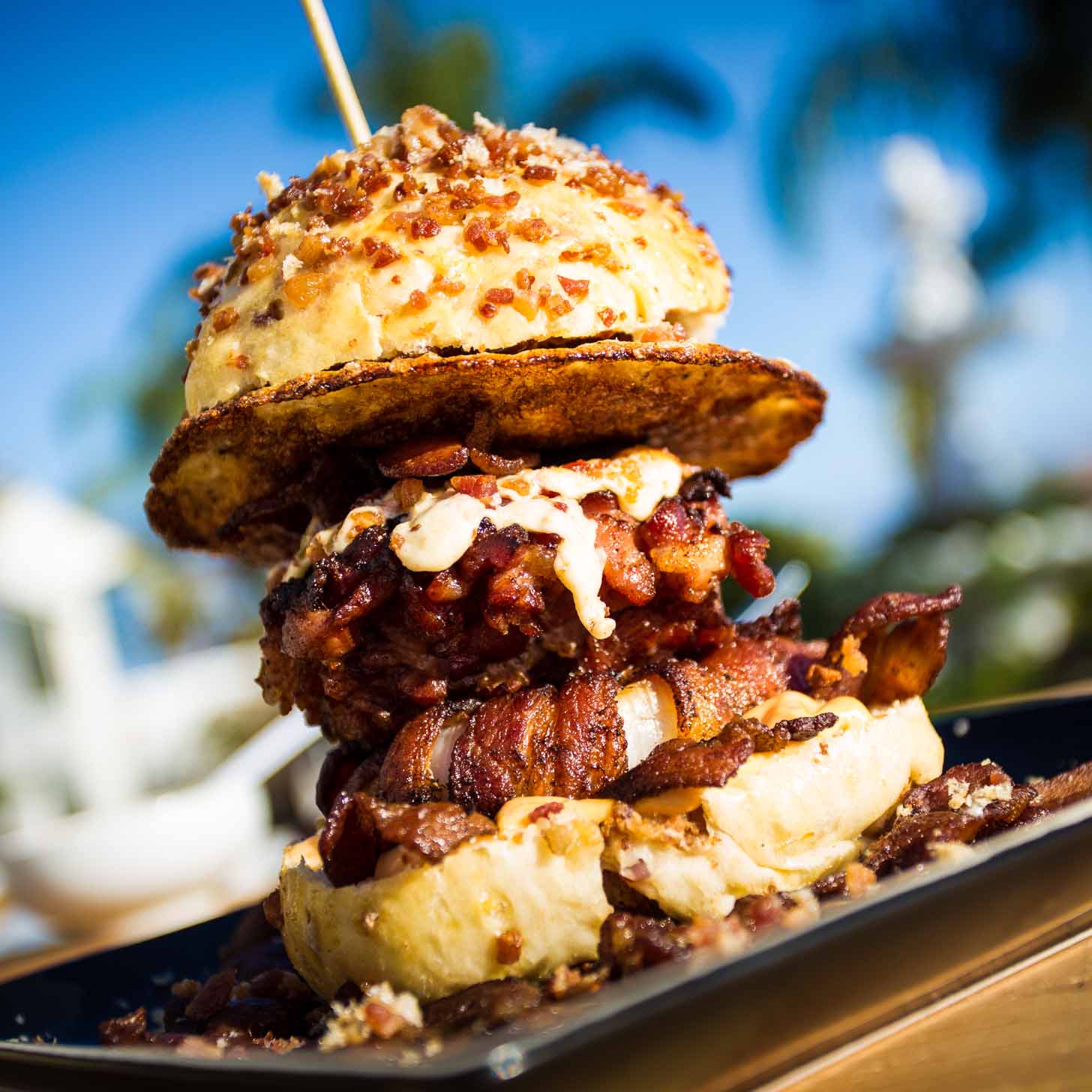 |
[TAG56]A family food blog with hundreds of simple, tested and approved recipes. Find easy step-by-step photo cooking instructions and video recipes. |
 |
[TAG57]This classic matcha latte recipe is easy to make and customize to your liking and always so delicious. The older I get, the more I’m convinced that one of |
 |
[TAG58]This veggie-loaded broccoli cheese soup recipe is perfectly velvety and creamy without using heavy cream. Instant Pot, Crock-Pot and stovetop options all |
 |
[TAG59]find out hundres of delicous food recipes |
 |
[TAG60]This winter farro salad recipe is made with the most delicious blend of seasonal fruit, greens, nuts, crumbled cheese and tossed with a vibrant orange ginger |
 |
[TAG61]This lovely white wine sautéed mushrooms recipe is quick and easy to make, full of rich savory flavors, and can pair well as a side dish with many different |
 |
[TAG62]The food blog with mostly healthy recipes made with real, whole foods inspiring more people to get into the kitchen and cook something good. |
 |
[TAG63]This traditional Swedish meatballs recipe is bursting with rich, savory flavors and topped with a creamy gravy. Always so comforting served over mashed |
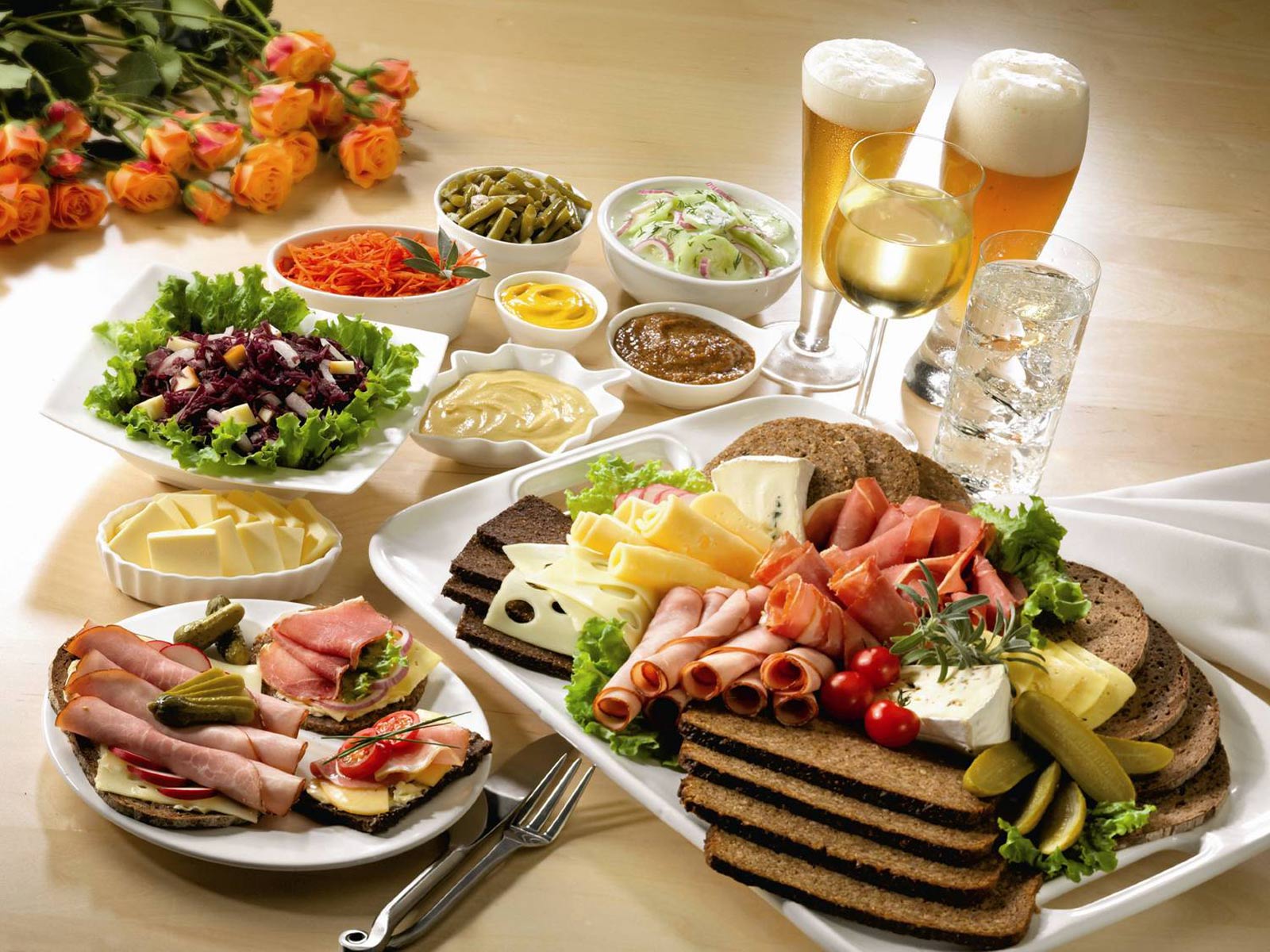 |
[TAG64]A food blog with hundreds of quick and easy dinner recipes. Classics done right, incredible one pot recipes, Asian takeout at home and holiday feasting! |
Did you miss our previous article...
https://belovedsaffron.com/recipes/the-best-potato-salad-recipe
.png)





